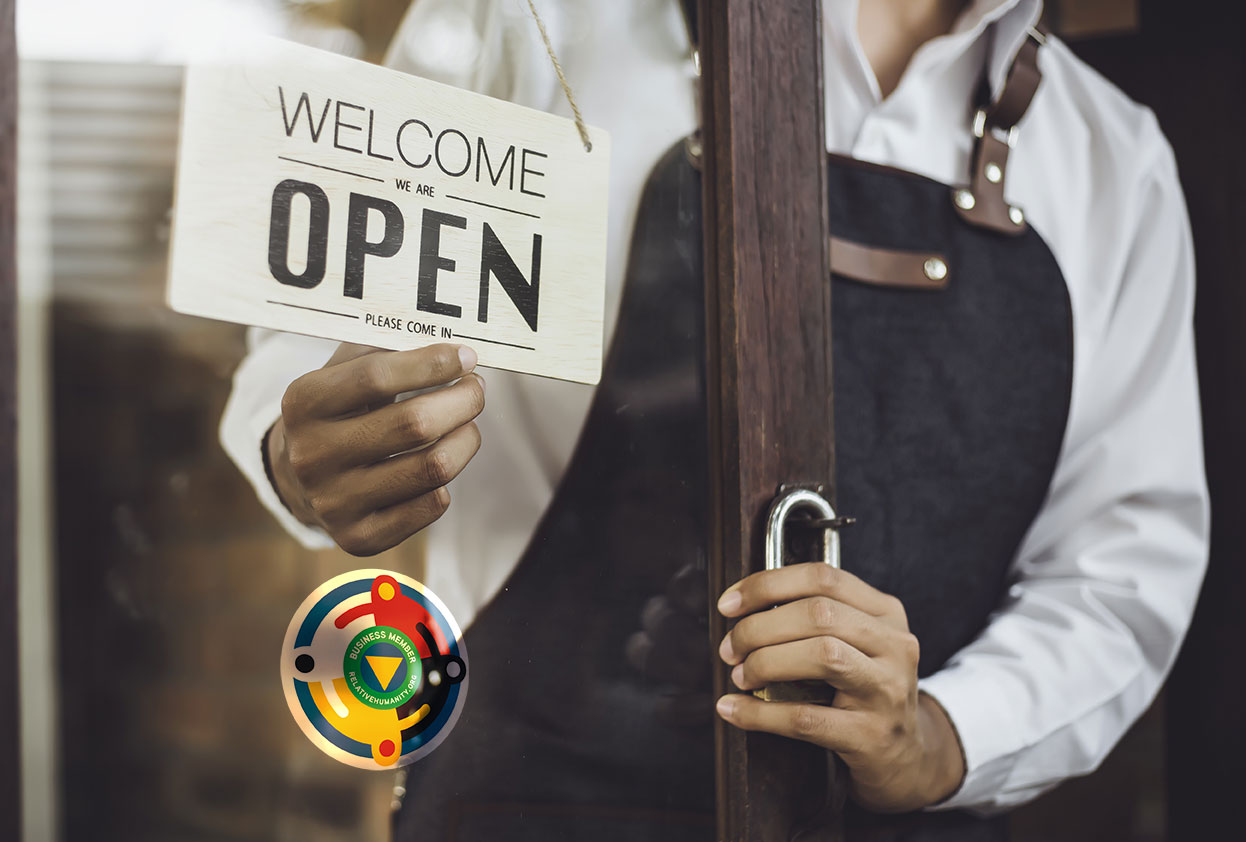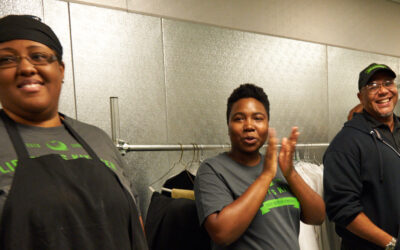Can local restaurants and shops play a role in promoting racial healing?
Teri Gautier and Caroline Mendez think so.
Teri Gautier and Caroline Mendez are co-founders of Relative Humanity, a network of small, independent businesses in New Orleans, Brooklyn, and Orlando that are publicly committed to promoting inclusivity across the city.
Member businesses pledge to adopt ethical and diverse hiring and business practices, donate money to local charities committed to racial healing, and welcome people of all backgrounds at their establishments, the “three pillars of commitment,” as Mendez describes it.
Stores, restaurants and other businesses that meet those standards can join Relative Humanity’s online directory and display the network’s logo in their windows or near a cash register, similar to a Better Business Bureau or other accreditation common among local storefronts. Mendez and Gautier hope the image grows as a symbol of inclusive businesses in New Orleans and elsewhere.

“It allows the community to understand which businesses are… trying to build equity and diversity within their business,” Mendez said.
The idea behind Relative Humanity started with a letter in 2016. That year, protestors were filling streets an hour-and-a-half away in Baton Rouge to call for justice for Alton Sterling, a Black man shot dead by white police officers in a convenience store parking lot. The Black Lives Matter movement was going global, spurring marches for justice in Brazil, France, South Africa and Australia.
Gautier wrote a letter to former President Barack Obama’s administration asking to pardon Leonard Peltier, a Native American activist, in the hopes that he could lead a national program dedicated to promoting racial healing.
Three years later, Gautier decided to put words into action on a local level. Gautier and Mendez started to brainstorm ideas for a name and a symbol that would convey their core message: We are one human race.
“From the first meeting the ideas swirled, and as Caroline designed, our conversations and ideas developed and evolved to the company name and its purpose.”
Historically, American businesses, large and small, have shied away from taking a public stance as protests and petitions called for social justice on issues like racial discrimination, immigration and pay equity. In recent years, businesses have faced growing public pressure to stand against hate and inequity across the country.
That came to a head in 2020 as millions of people across the world gathered to protest the deaths of George Floyd and Breonna Taylor, Black Americans who were killed by police officers. Online petitions calling for charges against the police officers who killed Floyd and Taylor circulated and reached millions over social media. The protests, largely peaceful, underscored the pervasive injustice and intense grief Black, brown and other marginalized Americans continue to experience in neighborhoods across the country. All this while the COVID-19 pandemic was killing Black and brown Americans at a disproportionate rate, exposing deep inequities in health care and the economy.
The events of 2020 showed that sitting on the sidelines is no longer an option, for businesses or individuals, Mendez said.
“The death of George Floyd, the incarceration of immigrant children, the rise of white supremacy and the dispute over the [DACA] Dreamers are reminders that there are centuries of circular movement in regard to equity for all humans,” they said. “It’s never linear and gaining a forward momentum to steadfast change.”
Relative Humanity also plans to leverage its platform to address how communities of color, Indigenous communities and other marginalized groups are represented in media. For centuries, the lived experiences of minority groups have been minimized, misrepresented or altogether erased from American media, Mendez and Gautier said.
“The purpose is to support a forward movement to human equity. We plan to keep the human race awake on the subject of diversity and inclusion.”
Relative Humanity will publish a digital magazine and manage social media accounts focused on sharing the experiences of people from communities currently overlooked or underrepresented in media. Each issue of the brand’s magazine will focus on a specific racial or ethnic group.
The goal is to give the broader community a look into the lived experiences of the full range of racial and ethnic groups that call New Orleans and other cities home, highlighting successes and joys in addition to challenges each group faces, Mendez said.
We’re trying to “paint a bigger, more whole picture of a culture and social group,” she added.
Mendez said the first issue, expected in early February, will focus on the articles written by Black writers featuring the stories of Black Americans. Similarly, future issues will feature work from writers who identify as part of the group being highlighted, Mendez said.
“It’s really important that the voices associated with that cultural group are the ones that are actually writing it,” Mendez said.
Mendez and Gautier believe that sharing people’s stories will promote empathy, and encourage more people to create safe spaces for all.
They’re still dreaming as big as they did in 2016. There’s never been an amendment to the U.S. Constitution that recognizes all humans as equal, Gautier noted. What if Relative Humanity could change that?
We want to “be a part of the force to keep the movement of equity [moving] in a forward direction.”




This is AMAZING! This is a beautiful mission and I’m glad to be a part of it by spreading the word in my neck of the woods!
Thank you Heather we really appreciate your support!
Beautiful, I’m overjoyed that this project has been launched—it will enlighten us and bring our global family closer. Well done!!